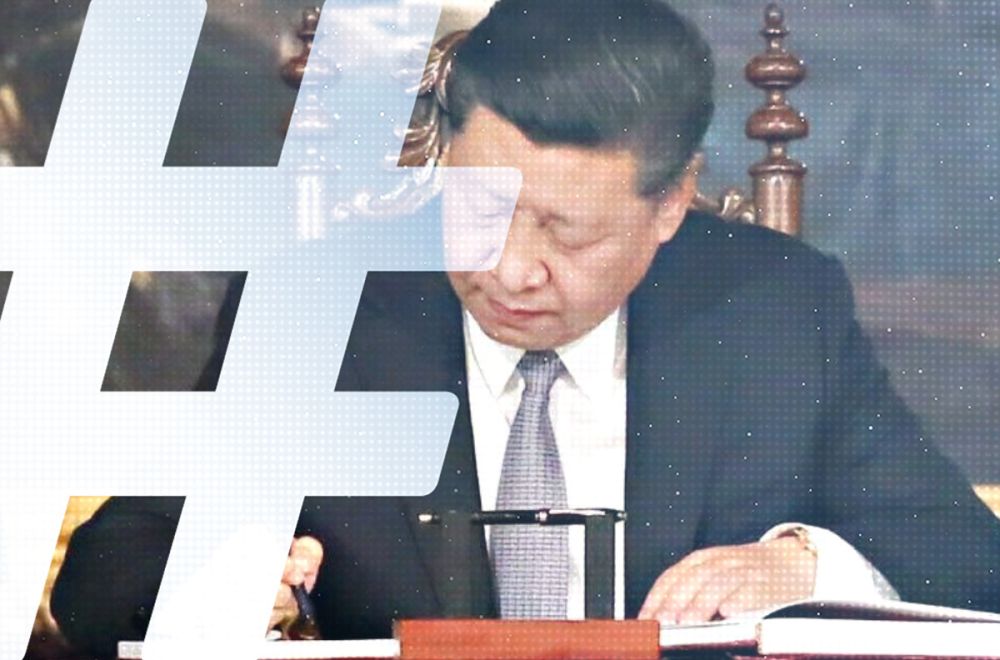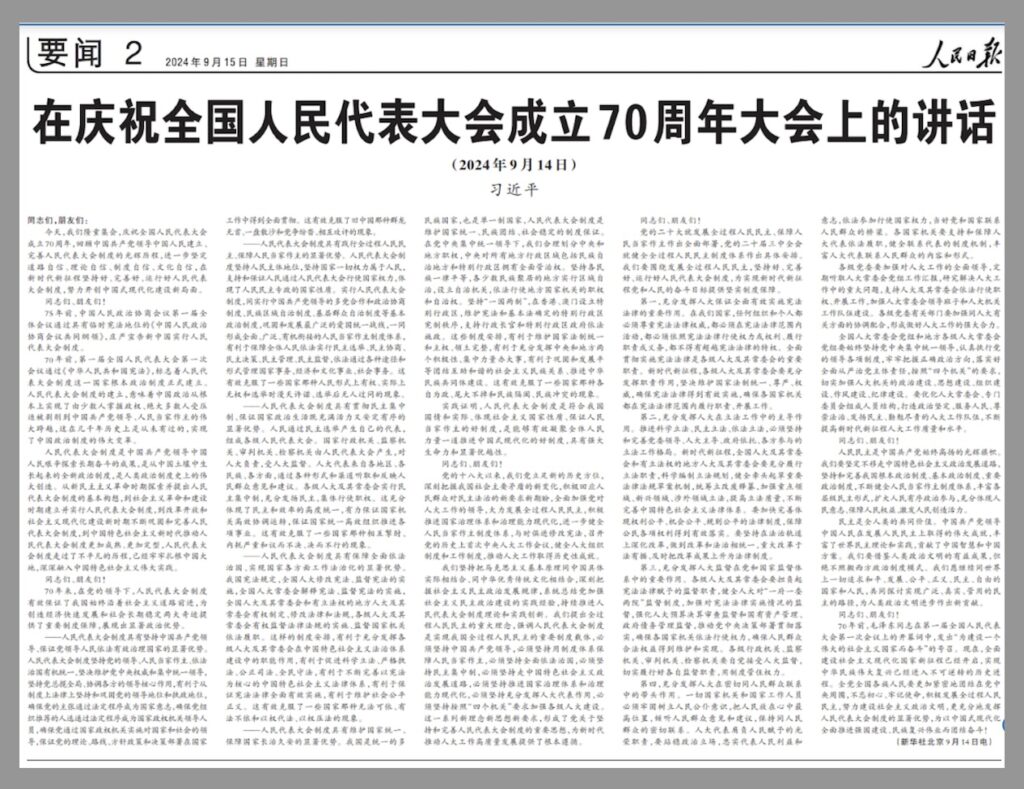
Xi Jinping is rarely out of the headlines, especially in the People’s Daily. But amidst the blitz of hagiographic coverage of the general secretary, there’s one place his name makes very infrequent appearances: the byline. Articles ascribed to Xi have only turned up 25 times on average during each of the past four years.
Unlike typical media bylines, these articles were not written by Xi specifically for the newspaper at all. Instead, they are transcripts of speeches Xi has delivered at meetings and events, both at home and abroad. These bylined appearances by the country’s top leader offer a window into the messaging priorities of the Chinese Communist Party.
But why do some speeches get byline coverage, and others not? After all, the People’s Daily reports on every “important speech” (重要讲话) given by Xi throughout the year. Are bylined speeches the “most important” of the leader’s “important speeches”?
Xi’s Different Hats
There is undoubtedly a system and set of criteria to decide which speeches are selected for bylines by People’s Daily editors and which are not. Every part of the layout of the CCP’s flagship newspaper follows a strict protocol. Xi’s name and how it appears must always be considered with extreme care. So how are Xi Jinping bylines determined?
Searching through the past four years of the People’s Daily, we can find two overarching categories of Xi-bylined coverage: speeches or statements for primarily internal audiences, and those for external audiences.

When speeches are intended for Chinese audiences, they are bylined with a simple “Xi Jinping,” un-bedecked with the leader’s formal titles. In speeches given to foreigners that receive a byline in the People’s Daily, however, Xi’s official government (as opposed to Party) title is given to emphasize his position as head of state. Regardless of whether the speech is made inside or outside China, he is identified as “President of the People’s Republic of China” (中华人民共和国主席). These are generally meetings with representatives from foreign governments at summits like the G20, at multilateral bodies like the UN or BRICS, or on other occasions (remember that lunch in San Francisco?) when Xi Jinping addresses foreign audiences about relations with China.
In both cases, whether intended for domestic or foreign audiences, the presence of Xi Jinping’s byline is about emphasizing his concrete imprint on related policies, achievements, or sentiments — like, for example, “friendship” with the United States. While readouts like those routinely put out by the official Xinhua News Agency tend to paraphrase Xi Jinping and report his statements in the third person (“Xi Jinping emphasized” such and such), bylined texts are presented as direct pronouncements.
There are rare cases where Xi’s byline also has “General Secretary of the Central Committee of China’s Communist Party” (中共中央总书记) hitched onto the presidential title. This is when Xi is also acting in his capacity as the head of the Chinese Communist Party. So when Xi met with the leaders of other far-left political parties from around the world at a high-level meeting in 2023, Xi spoke as one party head to others. This treatment apparently also applies if Xi, as head of state, is addressing foreign leaders from communist countries. Both titles appeared side-by-side when Xi addressed Nguyễn Phú Trọng in December 2023 — himself, like Xi, both the President of Vietnam and General Secretary of the Vietnamese Communist Party.
Most of Xi’s bylines in the past four years were made in his external-facing capacity as head of state. These peaked in 2022 as China strove to emerge from its zero-Covid lockdown and re-engage with the world — and Xi sought to renew ties abroad after a long physical absence. Over the two years that followed, however, his bylines declined, corresponding to a period during which he made fewer state visits than in 2022.
What does Xi generally talk about in his bylined articles? Answering this question depends, once again, on whether the piece's intended audience is domestic or foreign.
A Byline for All Seasons
In the domestic sphere, Xi speeches often get bylines when they deal with major recurring events on the CCP calendar. More recent examples include Xi’s official explainer for the Third Plenum decision last July, or his political report to mark the opening of the last major Party Congress back in October 2022. Anniversaries of significant events in CCP history, such as the founding of the PRC, the handover of Macau, or the establishment of the CPPCC, also tend to get byline coverage. Last but not least, bylines are often dragged out for speeches by Xi commemorating past officials regarded as foundation stones of Party history and legitimacy — marking, for example, the birthdays of Mao Zedong and Deng Xiaoping, and also of Qiao Shi (乔石), an official who rose to become China's third-ranked leader in the 1990s.
Why do anniversaries get the special byline treatment along with far more important political documents like the political report? Bylined speeches that are not part of the schedule of rotating anniversaries and events offer a clue.
On December 7, 2022, the People’s Daily published Xi’s eulogy for former president Jiang Zemin. Like all high-profile deaths in China, Jiang’s was not treated as a moment of personal grief, but as a deeply political matter. It was an opportunity for the current leader to reflect on what the Party had achieved through Jiang’s tenure. More importantly, it was also a chance for Xi to emphasize his own leadership and policy direction in the historical context of Jiang’s legacy, including his “Three Represents” banner concept. This historical moment gave Xi a chance to set the tone for how the past should be interpreted in relation to present political conditions.
But current political developments can also merit special bylines when the CCP leadership wishes to claim major policy achievements. Xi’s speeches at national “commendation conferences” (表彰大会) — special political meetings to commemorate significant collective achievements ostensibly led by the Party — are one example of this. The most recent, held in September last year, was on ethnic unity. In a speech just days before the 75th anniversary of the founding of the PRC, Xi praised his own approach to ethnic policy since 2012, saying that its “main line” (主线) had been “forging a strong sense of community for the Chinese nation.” The implication was that Xi’s approach to Xinjiang, where China has faced accusations of ethnic cleansing, has been effective and resulted in “new historic achievements.”
Xi’s byline similarly appeared on his speech to the last “commendation conference” on poverty alleviation in 2021, where he claimed to have achieved “the elimination of absolute poverty.” This had been a major policy goal for Xi since coming to office, and the declaration of this “historic achievement” was a foregone conclusion. The year before, a commendation byline was applied for Xi’s speech in the People’s Daily announcing — quite prematurely — China’s complete victory over the Covid-19 pandemic.
Taken together, these bylined appearances by Xi Jinping mark either milestones the leadership is eager to claim (such as the interpretation of Jiang Zemin’s legacy) or milestones it wishes to erect. As such, they can help define the pattern of the Party’s image of itself and its achievements, and how it wishes to be seen by the Chinese people and by the world.
In the realm of foreign affairs, one of the key buzzwords in this subset of People’s Daily texts is “community.” Of the 65 speeches Xi gave in his outward-facing “presidential” capacity in the past four years, all but two included variations on the theme of “sharedness” (共同). Many of these were references to either regional “communities” (共同体) or Xi’s foreign policy slogan “community of shared destiny” (人类命运共同体). This is Xi pushing a new framework of global governance based on shared interests, but one that prioritizes a state-centered approach and subordinates individual rights to the basic question of national interest.
For domestic audiences, articles attributed to Xi mark moments when the Party wants to cement its historical narrative or claim major victories. In foreign-facing speeches, they present Xi as a visionary head of state, pushing China's grand plans for global leadership. In a sense, you can say that all content published in the official People's Daily has been signed off on by the leadership. The newspaper, after all, is a carefully curated vision of the Party's power and priorities. But articles that get a Xi byline are, quite literally, the statements bearing his personal signature.




















